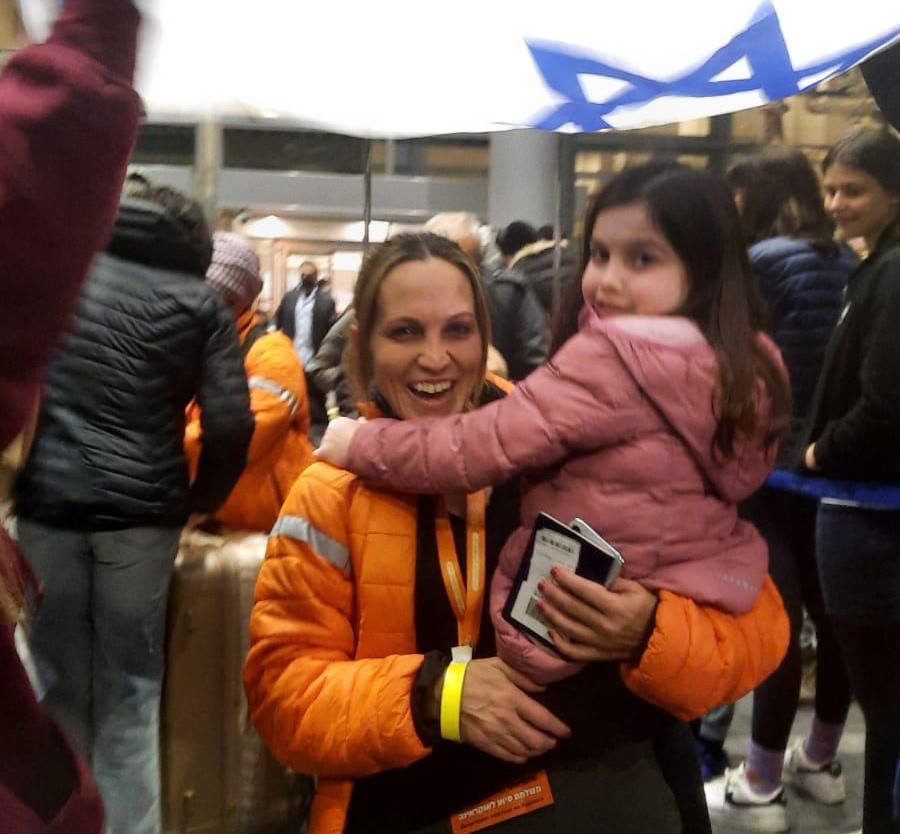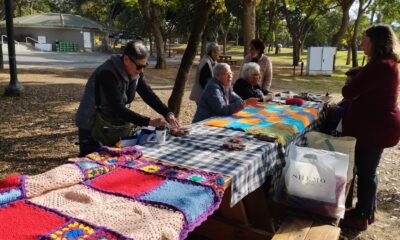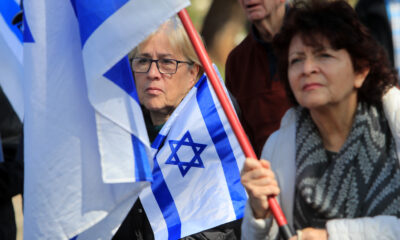
Banner

SA olim bring refugees in from the cold
Spending a night in a bus stuck in the snow in a remote area of Moldova is not the place you would normally find a South African-born Olah, therapist and mother of five children, Liza Kramer.
But trying to save the lives of Ukrainian refugees is not an everyday activity for anyone.
Kramer was born in South Africa, grew up in Australia and made aliya to Israel. She has a busy family therapy practice in Ra’anana. The night on the bus last week was her second without sleep on an emergency mission to assist Ukrainian refugees.
On 7 March, Kramer, who is a trained psychotherapist, got the call asking if she could join a mission that would be leaving in a few hours. “It wasn’t a great time to be leaving. I’m heading to South Africa for a wedding next week. But I called my husband. He’s South African and is a passionate Zionist. He said, ‘You have to go. There are few times in Jewish history where Jews have been able to stand up and say, ‘We’ve got you.’ This is one of those times.’ I also feel that if you’re able to help, you have an obligation to do so. So I agreed.”
Tanya Kuchar is a busy lawyer, a mother of four, and a volunteer medic living in Ra’anana. Even with these commitments, when she got the call to be at the airport in two hours to take part in an emergency mission assisting Jewish Ukrainian refugees, she didn’t hesitate. Within hours, her small Israeli airplane carrying tons of humanitarian aid landed at a tiny airport in Romania.
Born in South Africa, Kuchar attended Yeshiva College before making aliya with her family as a child. Now, she found herself standing in the freezing cold on a deserted airstrip on the border of Romania and Moldova, unloading tons upon tons of humanitarian aid with her own bare hands.
“This is only the second time an Israeli plane has landed at this airport, which has only one runway,” she says. “The airport wasn’t equipped for this kind of rescue effort, but we went ahead. We were the only ones there.”
Both women were there as volunteers of United Hatzalah, an Israeli volunteer-based emergency medical services (EMS) organisation based in Jerusalem. It’s one of many Hatzalah organisations in various parts of the world. They were sent to assist refugees on the ground and travel with them back to Israel as part of “Operation Orange Wings”, named after the colour of the organisation.
Kramer got the call at 11am and had to be at the airport at 5pm. “I cancelled my clients and called all my friends who had ever been skiing saying I needed winter clothes! I called my kids (aged six to 17) and they came to say goodbye. We landed in Romania and then had a four-hour drive to Moldova.”
Without sleep, she went to help in the kitchens. “Everyone just helps where we’re needed. That night, we drove out to the northern border which was another four-hour drive.” There, they set up a big tent with a huge Israeli flag “so people know where to come for help”. They wore orange gear and Kramer says people call them “the angels in the orange jackets”.
But she doesn’t feel like an angel. “On the ground, it doesn’t feel heroic. We’re so limited in what we can do and there’s almost no way to fix it. The devastation is so in your face and for what? But I was proud to be there as a representative of Israel. The Jewish state has a tremendous presence on the border.
“You see yourself in the refugees,” she says. “These are people with jobs and homes, leaving with a tiny suitcase. You see people your parents’ age and you wonder how anyone could be starting a new life at that age when they have lost everything.
“That night, it was about offering blankets and something warm to drink and helping them to take the next step. It was about saying, ‘I’m sorry this is happening to you. Israel is waiting for you. You are wanted somewhere,’ although so many people just wanted to go home.”
That night, they had to head back to their base, which was another four-hour drive. “It was snowing, and the drive was off-road for about 30 minutes. Our bus got stuck and we had to spend the night there. I was so tired, I did sleep, and we had enough petrol to keep us warm. Only the next day did I realise how isolated we were, in a very remote area. It wasn’t the safest thing,” she says. United Hatzalah offered to send emergency teams to get them, but they turned it down, not realising how precarious the situation was.
A lot of her time was spent in the medical tent, providing psycho-trauma support day and night. “In a war situation, people are still in the actual trauma, so it’s just about being there with them, looking them in the eye, and reminding them that they’re human and that whatever they’re feeling is appropriate in this abnormal situation,” says Kramer.
Kuchar’s trip was a whirlwind 24 hours, but she’s in no doubt that it was worth going. Five years ago, she took an EMT (emergency medical training) course with United Hatzalah to become a medic and first responder. She’s now deputy head of United Hatzalah in the Ra’anana and Herzlia area.
Assisting with emergencies has become part of her daily life and, in many ways, was preparation for this humanitarian mission. “My family and kids are used to it. It could be in the middle of a Shabbat meal or bath time. Before I left, I explained to my kids where I was going. My six-year-old daughter ran to her room, chose six dolls, and asked me to give them to children from ‘Ukrania’ [Ukraine in Hebrew] who don’t have homes and toys.”
Those dolls, with huge bags of toys, food, medicine, blankets, clothes and equipment travelled with Kuchar to Romania. “Once we unloaded everything, we had to load it on to buses. Half of our team went with the buses and half of us stayed at the airport and waited for the 160 refugees that would fly back to Israel with us.”
As the refugees arrived, they were given food, blankets and medical attention. “There were many mothers with children and old people. The mothers had no prams or equipment to help with their children and they were exhausted.”
Even with the language barrier, she understood their stories of displacement, multiple border crossings and leaving their husbands behind, not knowing if they would see them again. Meanwhile, the children “were just happy to be running around an airport. They received toys, sweets, and chocolates and we kept them busy to help their parents.”
In one photo of the mission, Kuchar is carrying a little refugee girl. Her arms may have been aching from unloading tons of aid, but she doesn’t show it. She’s calm and composed, a symbol of safety and the epitome of why a Jewish state is needed and the role it must play in tragedies like these.
“When we say, ‘never again’, it must be for everyone and anyone,” Kuchar says on what motivates her. “So many people have been displaced and, especially in Europe, it hits home. Humanitarian help has always been the Jewish way.”
Kramer says the experience showed her it could happen to anyone. “You can go from a comfortable life one day to a refugee the next. And you hope to G-d that someone will come and help you. Ukrainians would come and say to us, ‘Is there a way to be the Jewish?’ because they knew Israel would help.”
Kramer flew back to Israel a week later with 130 refugees. “It was chaotic because their needs were so great. But, in between, I paused and thought that 130 people have just been given a place to come home. Israel isn’t easy – I’ve been here 20-something years – so I know. But it’s a place of safety.”
Asked how she feels about being part of something so historic, she says, “This is one of the few times in our 3 000-year-old history that we’ve been able to choose to help. When I stood at the border with the Israeli flag, I don’t think I’ve ever felt prouder to be a Jew.”











Susan Weil
March 17, 2022 at 8:10 pm
A beautiful story. So be proud of My daughter, Hatzalah and feel so privileged to live in the Jewish State.
Steve
March 18, 2022 at 8:24 am
Hero’s. Ra’anana can be very proud. South Africans are always making a huge contribution in all aspects of Israeli life.